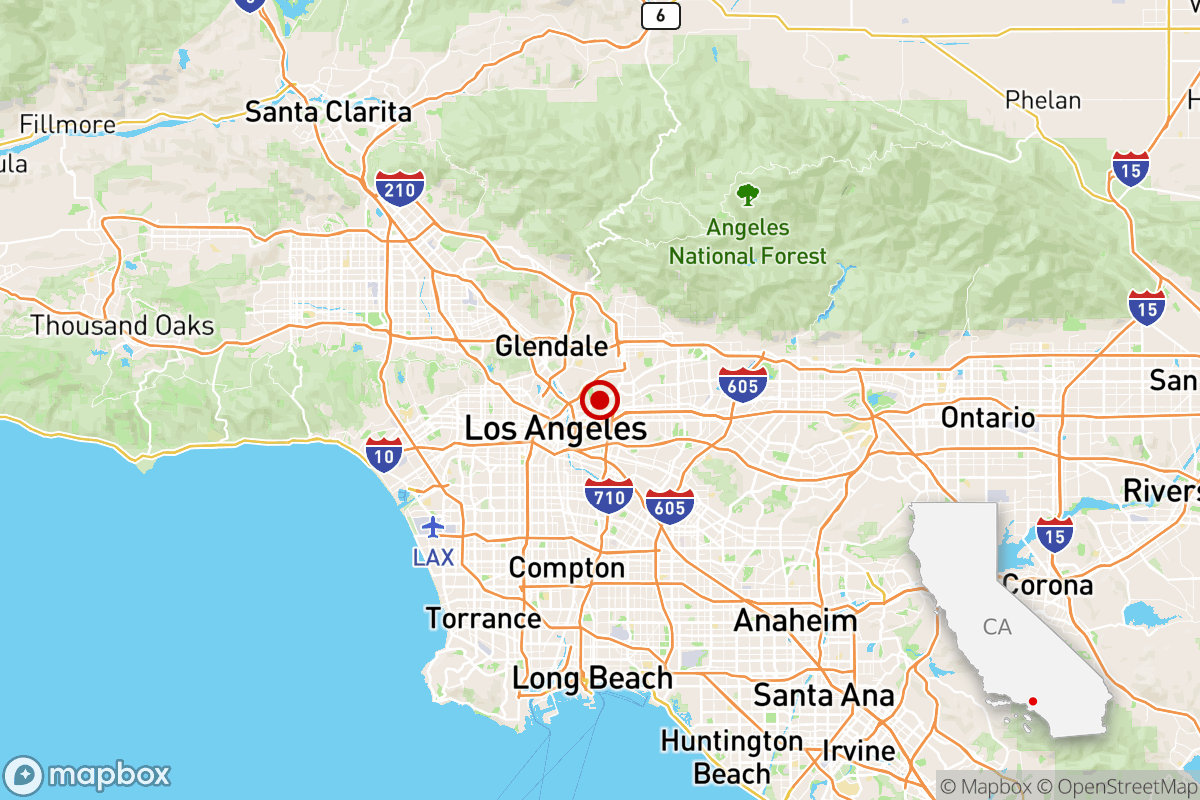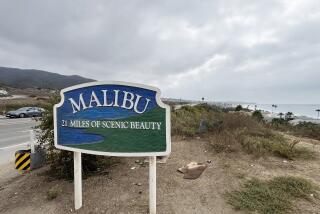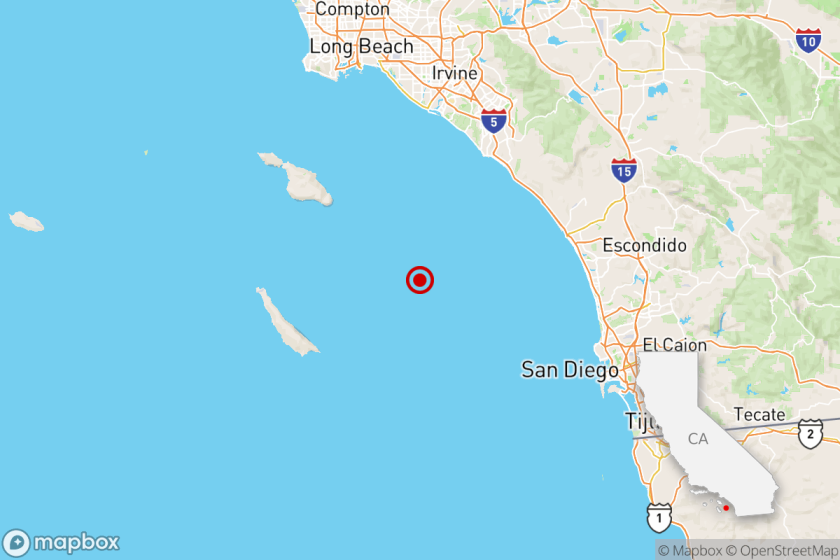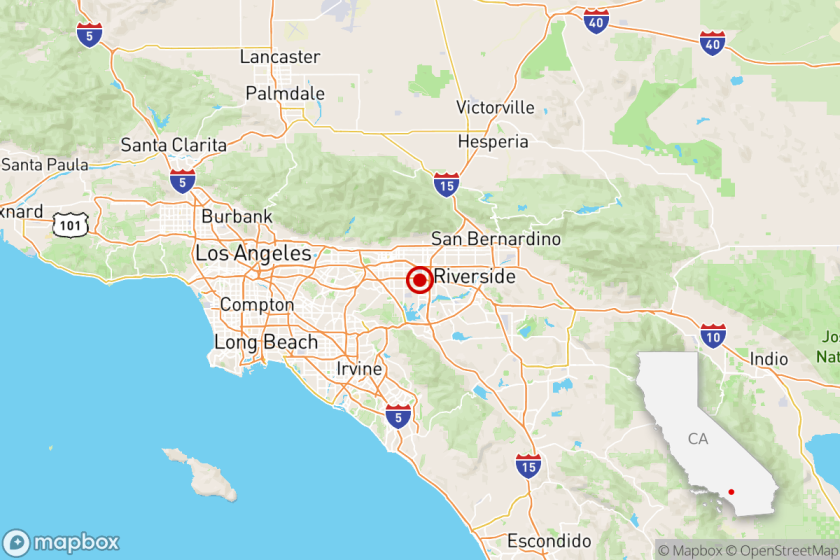Los Angeles’ Eastside shaken by third earthquake in a month

A magnitude 2.9 earthquake struck underneath the Los Angeles neighborhood of El Sereno on Monday morning, causing weak shaking throughout the Eastside and the San Gabriel Valley.
The earthquake, which occurred at 5:07 a.m., was initially reported as a magnitude 3.2.
Communities that may have felt weak shaking include Alhambra, South Pasadena, Monterey Park and East Los Angeles, according to the U.S. Geological Survey. There were no immediate reports of damage.
The epicenter occurred just southeast of the intersection of Huntington Drive South and Edloft Avenue. It was two-fifths of a mile northwest from the epicenter of a magnitude 3.4 earthquake that rumbled on June 2, and about one-quarter of a mile west of a magnitude 2.8 earthquake that struck on June 4.
Monday’s earthquake was reported as occurring at a depth of 6.3 miles, the USGS said. Assuming that depth is correct, the quake — like the earlier June temblors — was just beneath the plane of the Puente Hills thrust fault, said USC earth sciences professor James Dolan.
The Puente Hills thrust is a terrifying fault that has received far less attention than the San Andreas but is capable of generating catastrophic shaking.
A hypothetical magnitude 7.5 quake on the Puente Hills thrust fault — which runs under highly populated areas of L.A. and Orange counties — could kill 3,000 to 18,000 people, according to the USGS and the Southern California Earthquake Center.
A rupture of a small portion of the Puente Hills thrust fault caused the magnitude 5.9 Whittier Narrows earthquake, which occurred on Oct. 1, 1987, with an epicenter in Rosemead. That earthquake caused very strong shaking in areas close to the epicenter, including San Gabriel, Monterey Park, Montebello, Whittier, Pico Rivera, Santa Fe Springs and Norwalk. The Puente Hills thrust fault was only discovered in 1999.
Eight deaths were reported from the Whittier Narrows earthquake and a major aftershock, which caused extensive damage in Whittier, especially in old and unretrofitted brick buildings where walls partially or completely collapsed, as well as a partial collapse of the two-story concrete May Company parking garage. The earthquake caused serious damage on the campus of Cal State L.A. and at the freeway interchange of interstates 5 and 605.
The 1987 earthquake also caused minor damage to Whittier High School. One brick building in Pasadena completely collapsed.
The Puente Hills thrust fault is like an angled ramp deep underground — deepest along the 210 Freeway corridor, where it is about 10 miles deep, and shallowest about a mile south of USC, where it is 2 miles under the surface.
The Puente Hills thrust fault is underneath a swath of communities across the region, including Pasadena; downtown L.A.; East L.A.; Whittier; large portions of the San Gabriel Valley, from Alhambra to Rowland Heights; and northern Orange County.
An average of five earthquakes with magnitudes between 3.0 and 4.0 occur each year in the greater Los Angeles area, according to a recent three-year data sample.
About 10 1/2 hours after Monday’s L.A. quake, a stronger earthquake rattled Bakersfield. A magnitude 4.1 earthquake struck California’s Central Valley about 3:30 p.m.
The epicenter was located on farmland about 19 miles southwest of Bakersfield and about 16 miles northwest of the northern edge of the Grapevine section of the 5 Freeway, where the San Joaquin Valley ends at the base of the Tehachapi Mountains.
Weak shaking was felt in Bakersfield and may have been felt in Lebec and Frazier Park, along the border between Los Angeles and Kern counties, according to the U.S. Geological Survey.
Did you feel this earthquake? Consider reporting what you felt to the USGS.
Are you ready for when the Big One hits? Get ready for the next big earthquake by signing up for our Unshaken newsletter, which breaks down emergency preparedness into bite-sized steps over six weeks. Learn more about earthquake kits, which apps you need, Lucy Jones’ most important advice and more at latimes.com/Unshaken.
The first version of this story was automatically generated by Quakebot, a computer application that monitors the latest earthquakes detected by the USGS. A Times editor reviewed the post before it was published. If you’re interested in learning more about the system, visit our list of frequently asked questions.
More to Read
Sign up for Essential California
The most important California stories and recommendations in your inbox every morning.
You may occasionally receive promotional content from the Los Angeles Times.











